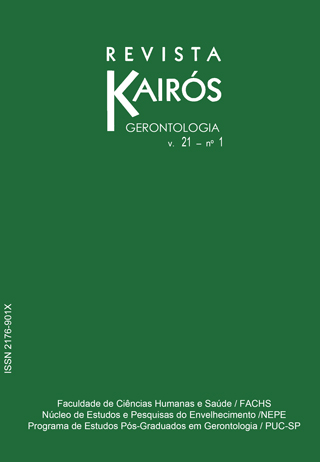Processo de desenvolvimento de um instrumento de avaliação sobre o nível de dificuldade percebido pelos cuidadores para os idosos
DOI:
https://doi.org/10.23925/2176-901X.2018v21i1p93-106Palavras-chave:
Cuidadores Familiares, Idoso, Coleção de dados, Atividades do dia a dia.Resumo
O objetivo deste estudo foi construir um instrumento para avaliar o nível de dificuldade percebido pelos cuidadores para com os idosos. Como métodos, estudo transversal, entrevista semiestruturada realizada com cuidadores informais de idosos. Na primeira fase deste estudo, foi realizada uma entrevista semiestruturada com a primeira amostra de cuidadores informais. A partir desses resultados, foi construído um instrumento de avaliação do nível de dificuldade sentido pelo cuidador informal durante a realização do cuidado. Na segunda fase, o instrumento foi utilizado com a segunda amostra de cuidadores informais, para avaliar sua consistência interna, por meio do coeficiente Alfa de Cronbach. Como resultados, o instrumento foi constituído por onze domínios e quarenta e oito itens. Cada item deveria ser classificado de 1 a 5, representando a melhor e a pior pontuação, respectivamente. A análise da Consistência Interna do Instrumento foi realizada por meio do coeficiente Alfa de Cronbach. Os valores do Alfa de Cronbach revelaram uma boa consistência interna para os onze domínios do instrumento, com o coeficiente variando de 0,74 a 1,00. Esses valores são considerados bons ou até excelentes. O valor do coeficiente Alfa de Cronbach total deste instrumento é de 0,98. Concluindo, a análise dos valores do alfa de Cronbach mostrou boa consistência interna para os onze domínios do instrumento, ou seja, as respostas no instrumento são coerentes com suas questões. O instrumento de avaliação chegou a avaliar a dificuldade que os cuidadores informais sentem quando cuidam dos idosos. Recomenda-se que o instrumento seja reproduzido em uma população-alvo representativa de validade externa.


